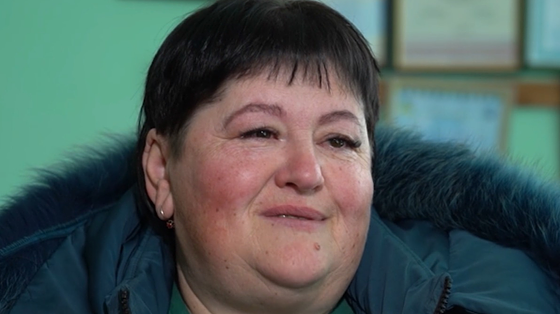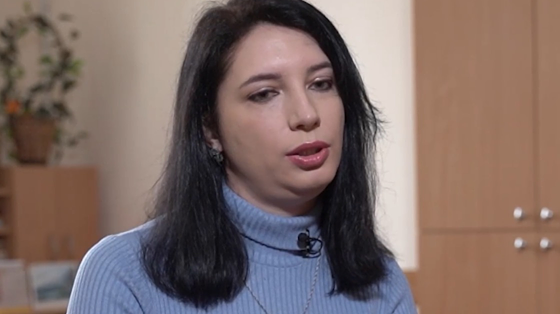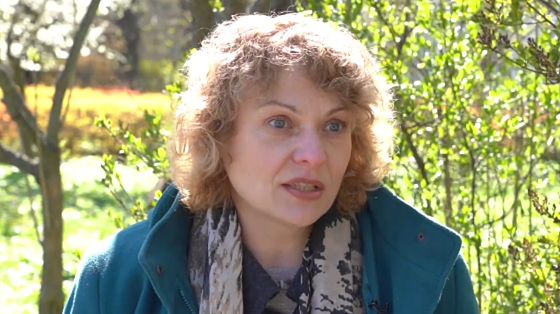Two months without medicines, adequate nutrition and under constant bombing – this is how Anna describes her experience in the bomb shelter of Azovstal steel plant.
When there was no food left to give to children, despite the shelling, men made their way to some destroyed warehouses, collected pasta, and cereals right from the ground.
The area of the steel plant was bombed in squares and many bomb shelters were destroyed. Agreements about the evacuation of civilians were constantly thwarted. Hopes for rescue faded with each passing day.
My family and I were at Azovstal, in the bunker (bomb shelter). The conditions there were terrible. We stayed amidst dampness and mould. A bed, well, it could hardly be called a bed. It was made of some overalls and padded jackets – it was all damp, even wet. Children lay there too. The conditions... there was no water; there was no chance to get a wash. We only had some amount of drinking water. It was only for cooking. We used water and food sparingly. We already counted for how many days our food supplies were enough.
And as time went on, our food reserves kept shrinking. We already knew that the remaining amount of food was enough for a week.
There were about 60 of us, and we already realized that we would not have food enough for a long time – those were our conditions. The military also had a limited amount of food by then.
There were no food supplies. All the warehouses were destroyed. We were already coming to the point when we had no food to give to our children, and so our men, at their own peril and risk, having waited for a suitable moment when it was quiet, went outside. On their way, they heard that the bombing resumed, but they still went to those warehouses anyway. Well, the military allowed us to take some food there because they knew that there were people in the bunkers. And they knew we were running out of food.
So our men went with backpacks and picked it from the ground. They collected pasta, they brought us pasta and oatmeal. We tried to cook all this somehow. We, adults, ate once a day, as we had to save food. For children... Well, Natalya (her husband called her Natasha) was in a role of our cook. Well, she was the bravest among us because she went out under the bombing attacks. The administrative building was above us, above the bunker, and she and her husband cooked food for all the people. She tried to feed the children a couple of times a day... She cooked for them separately and the children were given food separately. Well, in small portions, at least to keep them more or less fed.
Later, when strong air strikes began, it was impossible to stick your head out of the shelter, and the children did not see the blue sky at all.
We decided to collect and use those sanitizers with antiseptics that were at the plant’s departments and workshops. We decided to use those antiseptic liquids for cooking purposes. There were the stairs, the staircases above the bunkers. So we made fire on the stairs and cooked on that fire, while hiding in the bunker. The men made some kind of burners and put the pots on them. And she quickly went out to put some food into water.
Once the bombing started, she ran back into the bomb shelter. Well, we tried to survive like that. And cooked our food. The worst thing was the air bombing, for sure. Air strikes destroyed even the bunkers and so some new people then joined us in our shelter. They were brought at night. The military joined us too. Sometimes they were the targets for snipers. People came from the destroyed bomb shelters and told us those horror stories.
Some shelters caught fire and the military quickly took the people from there to us. We stayed there day and night, hiding from every incoming bombing or shelling attack. We were just waiting for that moment when our bunker would be destroyed.
Warships with missiles, those terrible marine missiles, and aircrafts. They struck the area as if having divided it in squares. The military came and said that the circle was narrowing and that our bunker was the next but one – that was it. They [the enemy] were not going to leave us out, and very little time remained.
Evacuation… We listened to the radio; we tried to catch some Ukrainian news. We heard that there was some kind of evacuation in the city. Buses departed from Port City shopping mall, but there was no way we could go there, because there was no any break in shelling and a sniper could get all of us too... Well, there was artillery shelling and airplanes were flying above us. The military said that we would not make it there. Even if they let us out, we would not make it. To take all the people out under such airstrikes… They told us to wait. Negotiations were underway. They sort of reassured us saying that negotiations were underway regarding civilians and that we would be evacuated. Well, they kind of supported us.
There were such moments when there was no hope left. We listened to the radio – negotiations were in vain, as they did not come to any agreements, and we just... We turned on the radio and heard every hour: Azovstal, Azovstal.
Ukraine did not forget about Azovstal, and we heard it. Well, all Ukraine knew that people were there. But the agreements kept failing, and we simply had no hope. So when the first evacuation started, the military came in and informed us. We had people who were on insulin, some disabled people who already needed urgent help. We had asthma patients, who had serious problems with breathing.
The military brought one inhaler for everyone. A medical officer said that he left us an inhaler, for both the military and us, civilians, and said, “I will leave it to you in case somebody would need it urgently, because the inhaler is running out. This is for an emergency case. If you are already suffocating in this bunker (dampness, and it was difficult to breathe even for those without health problems).” We were told that we could use an inhaler, but if urgently needed, they would come and take it.
Then, the first evacuation happened.
First, people in severe physical conditions were taken out, and we were told that gradually they were coming to an agreement and we would be evacuated too. That was it, they were taken out. And then this agreement was interrupted. We started listening to the radio again. Again the agreement failed and people were not evacuated. We waited and time kept running. We waited.
We sank into despair again. Some people were taken out, while we still stayed there with children. We had many small kids, many teenagers, everyone was scared, and everyone already had their nerves on the edge. Everyone was just afraid to die under a clear sky or in that damp and dark bunker. Everyone was scared and people almost had fits of hysterics. At night, if airstrikes began, all the people in the bunker were up on their feet. Everyone came out. The women cried bitterly, children screamed, and men still held it back, but everyone was in great fear, because the bunker was shaking. How many days did we wait?
We waited for about five days after the first evacuation and I had no hope. Me personally and many other people no longer had any hope. We did not hope to get out.
The military came and said, “We will evacuate you, get ready. Be ready, we will come and will take everyone out.” The military took us out and we are thankful to them, because there was an apocalypse there. The workshops came under major destruction and we had to climb up to such a height… We passed through such ruins; we didn’t see all this as we didn’t go out. The military carried someone elderly people in their arms, just carried them over. People’s legs failed and then the military helped. They supported everyone, carried them, took them out, brought them to the evacuation assembly point.
They handed us over. The UN and the Red Cross were there. We will continue our living, starting all our lives from scratch, together with our children. There are no clear plans yet.
We don’t know where and what, well, our values have changed. We kept a lot of things for later, didn’t use them, kept them for better times. Now I know that we need to use everything here and now.
Well, here’s my example. We got a new sofa. We collected money for a long time, as the sofa is quite expensive. I spared that sofa. I really didn’t even sleep on it, and almost didn’t sit on it either. It is a Van Dyck sofa. I did not allow the children… God forbid, they put a stain on it. Now, these values have all changed. Everything needs to be done in due time, and we all live for today now. We realized that we should not put off life for later. We need to live here and now, enjoying life, and not to store, not to cherish, but make use of and enjoy things now.







.png)



